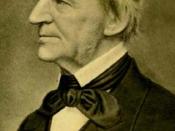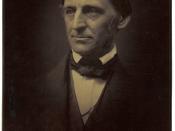MANY attempts have been made to compare the philosophy of Ralph Waldo Emerson with other systems of thought. When it is compared with Theosophy, a new point of view must be taken. For Theosophy is not a philosophy, but the Root-Source from which all philosophies have sprung. It is not the result of one man's speculation, but the synthesis of the knowledge of the ages which has been accumulated, recorded and preserved by a long line of Adepts. It is a complete whole, and admits of no comparison with anything less than itself. All that can be done, in the case of a single philosopher, is to examine the fruit of his mind in order to see if it was grown in the Garden of Wisdom.
Many are the Gardeners who have nurtured the Tree of Knowledge which grows in the midst of this Garden. The Theosophist knows Them as the Mahatmas.
Emerson described Them in these words:
"I cannot recite the laws of the intellect without remembering that lofty and sequestered class of men who have been its prophets and oracles, the high priesthood of pure reason, the Trismegisti, the expounders of the principles of thought from age to age. The truth and grandeur of their thought is proved by its scope and applicability, for it commands the entire schedule and inventory of things for its illustration."
In the teachings of these "great spiritual lords" as Emerson calls Them, certain fundamental concepts appear as the central sun around which the entire system of philosophical thought revolves. They are epitomized in a few pages of the Secret Doctrine as the "Three Fundamental Propositions" and are summarized by Emerson in the three Essays which are the most widely read of all his works: The Over-soul, Compensation, and Self-Reliance.
The First Fundamental...


